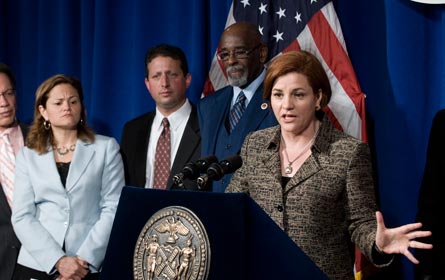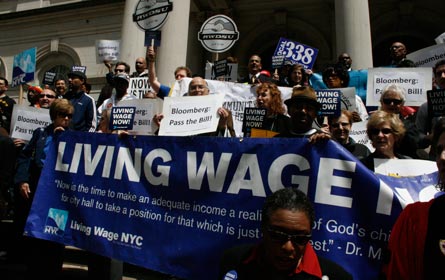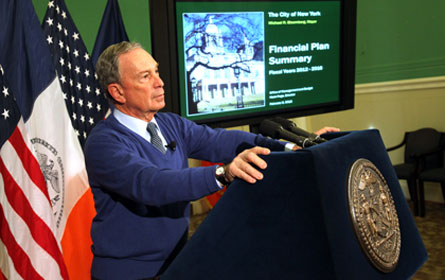NYC Council passes banking bill

NEW YORK – The New York City Council passed a bill requiring banks receiving billions in municipal funds to detail their lending practices, including mortgages and foreclosures, in struggling neighborhoods.
The bill, passed at yesterday’s stated meeting, highlighted the brewing conflict between powerful members of the City Council and the mayor’s office over the role of the government in the economy.
Mayor Michael Bloomberg said the banking bill was unrealistic. "Nobody would argue, I would think, that the city has the expertise or the resources to try to regulate the banking industry," he said. "It is just ridiculous.”
Some of the country’s largest banks, including JPMorganChase and Bank of America, are currently designated as depository banks by the city. Several other cities have enacted or are considering similar ordinances. The Los Angeles City Council passed its own so-called “responsible banking” act yesterday.
New York City Council Speaker Quinn said the bill was not aimed at creating a local regulatory framework. Instead, it was about making sure banks “act in a transparent way” and report information to the city of New York on what banks are doing to help neighborhoods and small businesses.
Councilman Albert Vann, the main sponsor of the bill, said lawmakers spent the last two years working on it and had consulted with the industry. “It is not an anti-bank bill,” he said. “Our objective in pursuing this legislation was to create a process that better informs New Yorkers about the banking needs of the neighborhoods and how to begin to meet those needs,” he said.
The bill passed by the council, which the mayor has threatened to veto, would create a new eight-member Community Investment Advisory Board that would collect and assess information from banks on their lending practices in local neighborhoods.
Supporters of New York City’s banking bill, including Quinn’s previous employer, the Association for Neighborhood and Housing Development, argue it will help policymakers make better decisions about where the city’s money is deposited and encourage banks to invest in communities.
Currently, the Department of Finance, which has also objected to the bill as too burdensome, oversees the city’s money, in conjunction with the city comptroller and the Banking Commission. The commission approves or denies applications from financial institutions seeking to do business with the city.
The City Council also sparred with the mayor over its decision yesterday to override his veto of a “prevailing wage” bill that would raise the wages earned by some workers employed by companies that receive city subsidies.
“In this day and age, this is not appropriate legislation if we want to get companies to come here and build this city,” he said yesterday. His administration has vowed to sue to stop the law from being enacted.
City Council Speaker Christine Quinn said the prevailing wage legislation was reasonable. "The vast majority of us at the City Council believe that when businesses decide of their own free will to take city subsidies or take a high level of city tenants, it is appropriate for us to put a fair additional wage requirement on them,” she said before the council voted to override the veto.
The Council also passed two resolutions at the stated meeting: one calling on the state Legislature to pass a law increasing the minimum wage from $7.25 to $8.50 an hour; the other appealing to Village Voice Media to reject adult advertisements on its Backpage.com website after allegations that sex-traffickers have been using it.
Quinn Presses Ahead on Living Wage

Council Speaker Christine Quinn is determined to keep politics polite — even if that means storming out of a press conference.
At a rally for the Living Wage legislation, Quinn declined to give her prepared remarks and excused herself after hearing a protester call Mayor Michael Bloomberg “Pharaoh Bloomberg” because he plans to veto the bill and has threatened to take it to court.
Turning around to face the crowd, Quinn demanded for an apology and was met with silence. “Democracy gives everyone the right to have differing opinions, and I’m not going to participate in name calling,” she said before leaving City Hall steps amidst boos and puzzled looks.
The Living Wage bill, which raises minimum wages for jobs in projects that are subsidized by the city, marks the Speaker’s latest and strongest stand against the Mayor as she leads up to her expected mayoral candidacy.
Battling for Fair Wages, Political Office
Advocates of a Living Wage have been fighting for the bill for over two years. Quinn’s support, which was only just garnered earlier this month, required a significant round of edits to obtain — particularly ensuring that only owners and not tenants in projects subsidized would not be required to pay higher wage. In the end, Quinn’s office estimates the legislation will only affect an estimated 600 workers a year.
Bloomberg has expressed unwavering opposition to the Living Wage bill and said last week he would veto the bill and take it to court, when he vetoed another fair wages bill that would have boosted minimum wages for employees in buildings where the city subsidizes the project or leases the majority of office space.
Under Quinn, the Council has overridden just 15 mayoral vetoes in the six years since she was elected Speaker. Three of those overrides have come in the last five months and yesterday’s bill, along with the other fair wage bill passed last month, will add another two to the tally.
Just as today’s legislation marks the Council and Quinn’s latest stand against the Mayor as she prepares to run for the office he's held for the last three terms, the Speaker’s outburst seems to reflect Quinn’s efforts to preserve her long-held relationship with the Mayor and his supporters.
Commenting later on her outburst, Quinn said that she felt strongly that government needed to be “civil, not personal. And that doesn’t involve name-calling.”
Quinn and the Mayor’s relationship has often been criticized for being too close, but Quinn said yesterday that much of her success has come from the pair’s “commonality and civility,” on issues like passing each year’s budget. “I’m very proud of my record — the part where we agree and the part where we don’t agree.”
The Impact
Though the day’s headlines will go to Quinn, the bill’s passage is quite personal and important for 29-year-old Kimberly Ortiz and her two children.
The bill would raise the hourly wages for jobs created in city-funded developments to $10 an hour with health benefits or $11.50 an hour without them. Studies show that that is what New Yorkers need to earn to stay out of poverty. The current minimum wage of $7.25 an hour forces many people who work to live in poverty, the bill’s advocates say. The requirement only would apply to future jobs in developments, such as shopping malls, that received a tax break or other subsidy from the city.
Ortiz has worked for the last five years at the Statue of Liberty’s gift shop making just $9.25 an hour. She has struggled for years to support herself and her two children, using food stamps to make ends meet and forgoing visits to the doctor because she can’t afford it.
On the steps of City Hall, Ortiz was cheerful and excited.
“This is the first time in a long time that I’m not angry on these steps,” Ortiz said. “Mayor Bloomberg calls this bill a job killer and all I have to say is that jobs that keep people in poverty should have died a long time ago.”
Bloomberg's Budget Avoids Teachers Cuts

The mayor’s $68.7 billion preliminary budget released last week spares teachers and uniformed employees from additional cuts and won’t raise taxes. However, funding for many other programs will shrink to accommodate growing pension and health care obligations.
Programs targeted for the biggest cuts include after-school, child care, libraries and cultural centers, programs which have faced the chopping block many times in the past but have enjoyed protection from council members. The financial plan also proposes closing twenty firehouses across New York City.
The mayor called his plan “a responsible budget that continues to make responsible spending cuts, while protecting the core services and investments.” He added “Cities across the country have struggled to keep their heads above water – laying off teachers, police officers, or firefighters…we’ve avoided those painful steps.” Last year, the mayor considered laying off 4,000 teachers. New York State pays only 39 percent of the city’s education expenses.
Councilman Domenic Recchia, the chairman of the city council’s finance committee, said that the plan was “not as bad as we thought it was going to be” and that it was balanced and fiscally responsible. However, he said, the council will push against cutting $74 million from libraries and $40 million from cultural institutions.
Public Advocate Bill De Blasio also criticized the mayor on cutting child care and after school programs, which he had repeatedly supported in the past. Cutting these programs could wreck many parents’ working schedules, potentially endangering their jobs and putting their children in uncertain situations, he said. The cuts would also affect employment in the day care sector.
“Living within our means must be our top priority. But we cannot stop investing in our future. This is why I am disappointed the Mayor put forth a budget proposal that hurts New York’s children and makes it harder for families to work,” said De Blasio.
Some council members, including De Blasio and Council Speaker Christine Quinn also opposed plans to shutter 20 fire houses, which they deem essential to public safety. A spokesman for the fire department said that the proposal is undergoing review and it’s too early for the department to comment on any specifics.
Last year, many of these programs faced cuts as well but the city council wrangled a concession to keep most of them, adding $300 million to the budget.
The city ran into an approximately $2 billion budget deficit this year, which it balanced through revising calculations for pension liabilities, using some of the previously reserved surplus and the sale of new taxi medallions. In a year, the gap is expected to grow to over $3 billion.
Most of the rising costs come from pension and health care. Citywide, pension costs were equivalent to 66 percent of salaries and wages while in the uniformed workforce, pension costs already exceeded the cost of salaries and wages. By 2013, pension obligations will be 500 percent higher than they were in 2002, at $8 billion.
“Pensions are leveling off but at a high level,” said Doug Turetsky, communications director with the Independent Budget Office. “Which squeezes out other spending we might want to do on other programs and services.”
Turetsky added that health benefits are another major area of cost growth and that even though medical inflation is down, it continues to have a strong effect on the city’s economy.
Even though New York City gained back 65 percent of its jobs to the country’s 36 percent, its rebound is sluggish. Uncertainty in the Euro zone hit the returns on pension investments and the financial sector, which contributes about 10 to 20 percent of the city’s tax revenues didn’t add any jobs. Most of the city’s job growth has been in low-income positions. The residential real estate market remains very slow, which slows construction and drives down property tax revenues.
Commercial real estate is doing much better, with only a 9 percent vacancy rate and office space sales at their decade highest, according to Recchia. The city’s tourism industry is also booming, having attracted a record 50.5 million visitors in 2011. Many hotels are operating at full capacity.
Under the plan, the mayor proposed raising capital expenditures by $700 million over the next five years, to total $39.4 billion. Part of that would go towards the construction of the new NYCTech campus for Cornell University on Roosevelt Island, which is expected to provide 30,000 permanent jobs and create 600 spin-off companies.
The financial plan will go through agency hearings in March, when many programs will fight to lose as little as possible. But the overall sense among council members is that the plan, while not all desirable, is less painful than the budgets of previous years.
“Today’s Preliminary Budget, following on the Governor’s proposed Executive Budget last month, gives us all hope that the worst effects of the economic downturn are finally starting to pass,” said Recchia.




